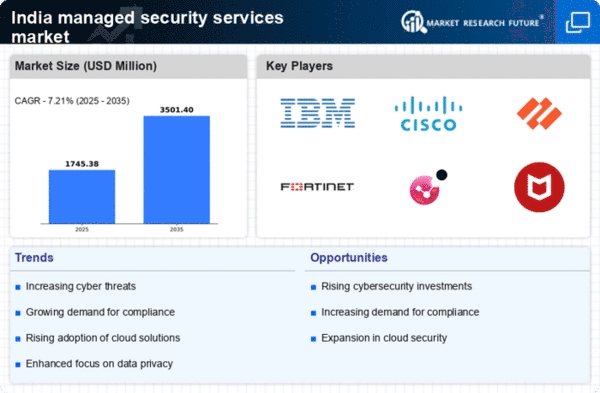Growing Regulatory Requirements
The evolving regulatory landscape in India is a significant driver of the managed security services market. With the introduction of stringent data protection laws and compliance requirements, organizations are compelled to adopt comprehensive security measures. The Personal Data Protection Bill, which is expected to be enacted soon, will impose strict obligations on businesses regarding data handling and security. As a result, companies are increasingly turning to managed security services to ensure compliance and avoid hefty fines. This trend is likely to accelerate as regulatory bodies continue to enhance their focus on cybersecurity, thereby creating a robust demand for managed security services in the market.
Expansion of Remote Work Culture
The expansion of remote work culture in India is reshaping the managed security-services market. As more organizations adopt flexible work arrangements, the attack surface for cyber threats has broadened, necessitating enhanced security measures. In 2025, it is estimated that over 30% of the workforce in India will be working remotely, which presents unique challenges for IT security. Companies are increasingly recognizing the need for managed security services that can provide secure access to corporate resources from various locations. This shift is likely to drive demand for solutions that ensure data protection and secure communication channels, thereby contributing to the growth of the managed security-services market.
Adoption of Advanced Technologies
The integration of advanced technologies such as artificial intelligence (AI) and machine learning (ML) into security solutions is driving the managed security-services market in India. These technologies enhance the ability to detect and respond to threats in real-time, making security measures more effective. In 2025, the AI in cybersecurity market is projected to reach $46 billion, indicating a strong trend towards automation in security processes. Organizations are increasingly seeking managed services that leverage these technologies to improve their security frameworks. This trend not only helps in mitigating risks but also reduces operational costs associated with maintaining in-house security teams, thereby fostering growth in the managed security-services market.
Increasing Digital Transformation
The ongoing digital transformation across various sectors in India is a primary driver of the managed security services market. As organizations increasingly adopt digital technologies, the complexity of their IT environments grows, leading to heightened security risks. In 2025, it is estimated that the digital economy in India will reach $1 trillion, necessitating robust security measures. Companies are recognizing that traditional security measures are insufficient to combat sophisticated cyber threats. Consequently, there is a growing demand for managed security services that can provide comprehensive protection against potential breaches. This trend is likely to continue as businesses seek to enhance their security posture while focusing on core operations, thereby driving growth in the managed security-services market.
Rising Awareness of Cybersecurity
There is a notable increase in awareness regarding cybersecurity among Indian enterprises, which is significantly influencing the managed security-services market. Organizations are beginning to understand the potential financial and reputational damage that cyber incidents can cause. According to recent studies, nearly 70% of Indian businesses have experienced some form of cyber attack, prompting them to invest in advanced security solutions. This heightened awareness is leading to a shift from reactive to proactive security measures, with many companies opting for managed services to ensure continuous monitoring and threat detection. As awareness continues to grow, it is expected that the demand for managed security services will expand, further propelling the market forward.
















